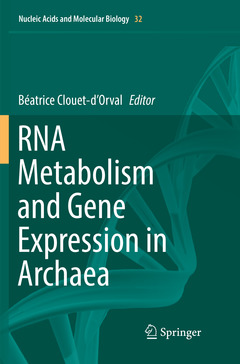Description
RNA Metabolism and Gene Expression in Archaea, Softcover reprint of the original 1st ed. 2017
Nucleic Acids and Molecular Biology Series, Vol. 32
Coordinator: Clouet-d'Orval Béatrice
Language: English
Subjects for RNA Metabolism and Gene Expression in Archaea:
Keywords
Archaea; transcription; translation; RNA processing; ribonucleases; non-coding RNAs; CRISPR; Archaea third domain of life; RNA metabolism in Archaea; extremophiles; evolution of RNA biology; RNA in Bacteria; Eukarya; Archaea; archaeal tRNA rRNA; archaeal RNA polymerase; RNA-degrading enzymes in Archaea; archaeal RNase P; Evolution of C/D box sRNAs; Haloarchaea; methanogenic Archaea; halophilic Archaea
Publication date: 05-2018
Support: Print on demand
Publication date: 11-2017
Support: Print on demand
Description
/li>Contents
/li>Biography
/li>Comment
/li>
This book focuses on the regulation of transcription and translation in Archaea and arising insights into the evolution of RNA processing pathways. From synthesis to degradation and the implications of gene expression, it presents the current state of knowledge on archaeal RNA biology in 13 chapters. Topics covered include the modification and maturation of RNAs, the function of small non-coding RNAs and the CRISPR-Cas defense system. While Archaea have long been considered exotic microbial extremophiles, they are now increasingly being recognized as important model microorganisms for the study of molecular mechanisms conserved across the three domains of life, and with regard to the relevance of similarities and differences to eukaryotes and bacteria. This unique book offers a valuable resource for all readers interested in the regulation of gene expression in Archaea and RNA metabolism in general.
Béatrice Clouet-d'Orval, is a Research Director at the Centre de Biologie Intégrative, Toulouse (CBI/CNRS/Université de Toulouse). She received her degree in Genetics and Biochemistry from the Université Pierre et Marie Curie, Paris, and subsequently obtained an EMBO fellowship for postdoctoral research at the University of Colorado, Boulder.
Béatrice Clouet-d'Orval believes that the emergence of model organisms permitting genome-wide approaches that allow for the study of RNA biology in Archaea represents a unique opportunity to obtain major insights into evolutionary conserved RNA processing pathways in the three domains of life. Her research interests include in vitro reconstitution of archaeal ribonucleoprotein complexes involved in tRNA modification, and identification and characterization of archaeal enzymes involved in RNA processing and degradation. In addition, she is also active in promoting networking between scientists working on RNA and Archaea.
These books may interest you

Regulatory RNAs in Prokaryotes 158.24 €



